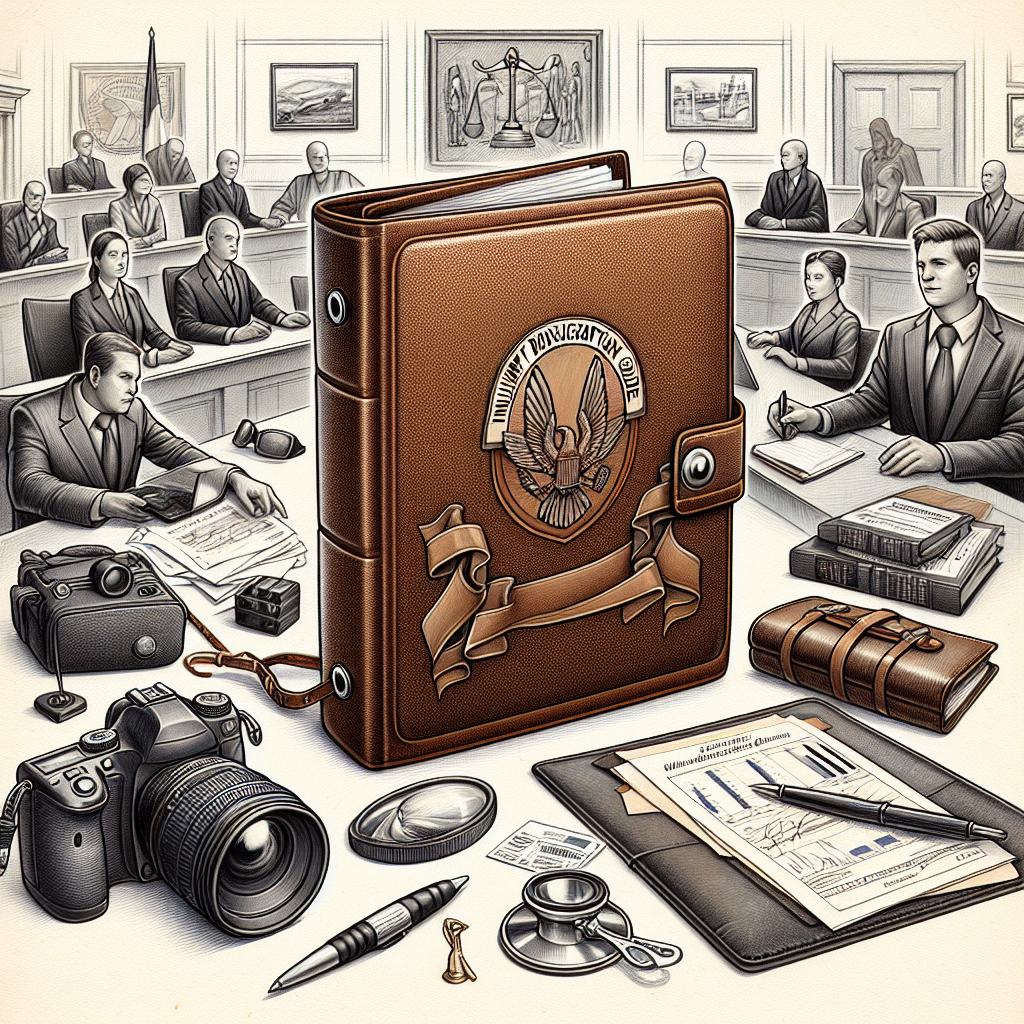Understanding the significance of accurately documenting your injuries cannot be overstated, especially when pursuing a legal course. Meticulous records can be pivotal to demonstrate the extent and impact of the injuries you suffered to a court, insurance adjuster, or another party involved. This section aims to enlighten you about the importance of injury documentation in the context of personal injury law.
Enhances Credibility
First and foremost, injury documentation serves as substantial evidence and provides credibility to your claims. In situations where your word is up against the party responsible for your injury, comprehensive documentation can tip the scales in your favor. Having medical reports, photographs of injuries, and eyewitness accounts can significantly strengthen your case as these materials objectively substantiate the injuries you claim, reducing the chances of skepticism or counterclaims from the opposing party.
Maximizes Compensation
Secondly, thorough documentation can directly impact the amount of compensation you might receive. In personal injury lawsuits, compensation often depends on the perceived severity and long-term effects of your injuries. Detailed records can effectively illustrate the profound impact of the injury on your life, thereby potentially maximizing your compensation. For instance, if your injuries prevented you from working or led to substantial medical expenses, documenting these facts can help quantify the financial losses you endured due to the injury.
Facilitates Continuous Care
Lastly, maintaining well-detailed records can facilitate continuous medical care. In situations where ongoing or future treatment is required, your healthcare provider can refer to your comprehensive documentation to understand the history, progression, and nature of your injuries. This can enable them to formulate the most effective treatment plans, ensuring a smoother recovery process. Moreover, highlighting the need for future healthcare through documentation can aid your attorney in arguing for compensation that includes projected medical costs.
Bear in mind, carefully documenting every detail related to an injury not only bolsters your legal position but also aids in recovery. Hence, it is crucial not to disregard this significant step in the aftermath of an unfortunate event.
Initial Steps to Take After an Injury
Seek Immediate Medical Attention
The first and most crucial step after an injury is to seek immediate medical attention. Whether the injury is minor or severe, a medical professional will be able to examine, diagnose and treat your condition accurately. Not only does this protect your health, but it also establishes a crucial timeline for your case that shows when the injury occurred and the actions taken afterwards. It’s imperative to follow the treatment plan advised by your doctor as any deviations can impact your legal claims.
Gathering Initial Evidence
Once your immediate medical needs have been addressed, start collecting evidence. This might include photographs of the injury, the scene where the injury took place, any visible damage, or conditions that contributed to the injury. Witness testimonies can hugely bolster your case, so ask anyone who saw the incident to provide a statement. Remember to also keep a record of any interactions you have had with the people involved in the event, including the conversation that took place immediately after the injury.
Report the Incident
It’s vital to report the incident to the concerned authorities promptly. If the injury happened at work, notify your employer. If it was caused by a car accident, contact the police. Reporting the incident serves a dual purpose. First, it initiates an official investigation into the matter. Second, it produces an official document that can be used as evidence, such as a police accident report or a workplace incident report.
Documenting Relevant Expenses
Lastly, keep track of all expenses related to your injury. These could include medical bills, therapy costs, mileage to doctor appointments, lost wages, and any other costs you’ve incurred as a result of the injury. Keep all receipts, invoices, and statements related to these expenses, as they’ll be essential in calculating compensation during the legal process.
Collecting and Organizing Essential Evidence
When pursuing a personal injury claim, the evidence you gather and how you organize it can significantly influence the outcome of your case. This section will guide you through the process of collecting and organizing all required documentation.
Gathering Crucial Evidence
Beyond the general narrative of what occurred, your claim’s strength lies in the pieces of evidence that substantiate your account. There are several types of evidence you should prioritize for collection.
Firstly, make sure to acquire a detailed medical report from a healthcare professional. This report should include the extent of your injuries, the expected recovery period, and treatments you require. Secondly, photograph or video document your injuries as soon as possible after the incident. These should be taken over time to show the progression of your injury and its impact on your daily life.
Thirdly, collect any witness statements. If anyone was present during the incident, their eyewitness accounts can greatly bolster your case. Lastly, any official accident reports, like police reports or incident reports from your workplace, can provide an impartial overview of the accident.
Maintaining Accurate Records
Demonstrating the financial impacts of your injury is vital to corroborating your claim. To this end, you’ll need to keep accurate records of all related expenses. Keep original copies of all medical bills, prescription costs, and receipts for any other out-of-pocket expenses tied to your injury or treatment. If your injury caused you to miss work, keep a record of lost income.
While these forms of evidence are quantifiable, do not underestimate the value of a personal record. Maintaining a diary of your pain levels, emotional state, missed activities, and overall challenges you face due to your injury can provide powerful supplementary evidence.
Organizing Your Evidence Effectively
Once you’ve collected all relevant evidence, it’s crucial to organize it in an easily accessible and comprehensible manner. Create a system that allows for easy retrieval of any document or piece of evidence. This can be achieved by organizing materials into categories like medical reports, personal records, expense receipts, and witness statements.
A digital backup of all evidence is also recommended, as it provides an extra layer of security and simplifies sharing information with your legal counsel. Remember to update your files regularly as you receive more documents or incur additional expenses related to your injury.
Thoughtful collection and organization of your evidence will strengthen your injury claim and boost your chances of legal success.
Writing a Detailed Incident Report
The Importance of Precision in Reporting
Writing a detailed incident report is crucial in documenting your injury for legal success. This report provides a factual account of what transpired, helping to cement your case when it comes to seeking legal recourse. Accuracy and precision are keys to creating an effective incident report. Be as specific as possible about the date, time, and location of the incident. Describe the conditions or events leading up to the incident, including the persons involved and any potential witnesses.
Details of the Injury and Immediate Action Taken
The details of the actual injury should be written with clarity and specificity. Describe your injuries as accurately as possible, noting the parts of the body that were affected and the type of injuries incurred such as lacerations, fractures, burns etc. It’s also important to document any immediate action that was taken post-injury, whether medical help was sought, if first aid was administered, or if there were any immediate implications on your health or ability to work.
Recording Witness Statements and Other Evidence
While putting together your incident report, remember to include statements from any witnesses. These can bolster your report as they provide third-party accounts of what happened. Ensure these statements are accurately reported and each witness is identified by their full name and contact information. Other forms of evidence such as photographic or video documentation of the scene, and even official police reports if available, should likewise be included. These pieces of evidence can be crucial in supporting your claim when it goes to court.
Utilizing Professional Medical and Legal Services
Employing Expert Medical Services
First and foremost, after sustaining an injury, your health should be your priority. Seeking professional medical help immediately is not only vital for your wellbeing but also crucial for establishing an official record of the injury. A comprehensive medical examination will determine the extent and severity of your injuries, which could be significant in a legal context.
Ensure to narrate all your symptoms to the healthcare professionals without leaving out any detail, however minor it may seem. Record all appointments, treatment plans, prescribed medication, and any recommendations or prognosis made by the medical expert. If possible, request copies of all medical records, as these will provide an objective backbone to your case.
Leveraging Legal Aid
Next, consider consulting with a legal professional who specializes in personal injury. An attorney can help you understand your rights, assess the viability of your legal claim, and guide you through necessary procedures. Keep in mind that different types of injuries and situations require unique legal approaches, and only a skilled and experienced lawyer can effectively navigate these complexities.
When choosing a lawyer, consider their experience, success rate in similar cases, and rapport. It is essential that you feel comfortable with your attorney as you’ll likely be sharing personal details of the incident and your life. Do not hesitate to ask potential lawyers about their fees and payment structure, to ensure transparency and prevent any unexpected costs.
Ongoing Documentation
In both medical and legal scenarios, ongoing documentation is key. Make a habit of storing all related paperwork, such as medical bills, prescription receipts, lost wage information, correspondence with insurance companies, and any other financial costs directly linked to your injury. Having a well-documented and organized case can significantly impact its outcome.
Also, maintain a personal diary where you record your physical pain levels, emotional distress, and how the injury affects your daily life. These subjective experiences can form a critical part of your claim and can be crucial in determining the compensation you receive.
By effectively using professional medical and legal services, you are ensuring your case is supported by expert perspectives that could potentially bolster your legal position.



